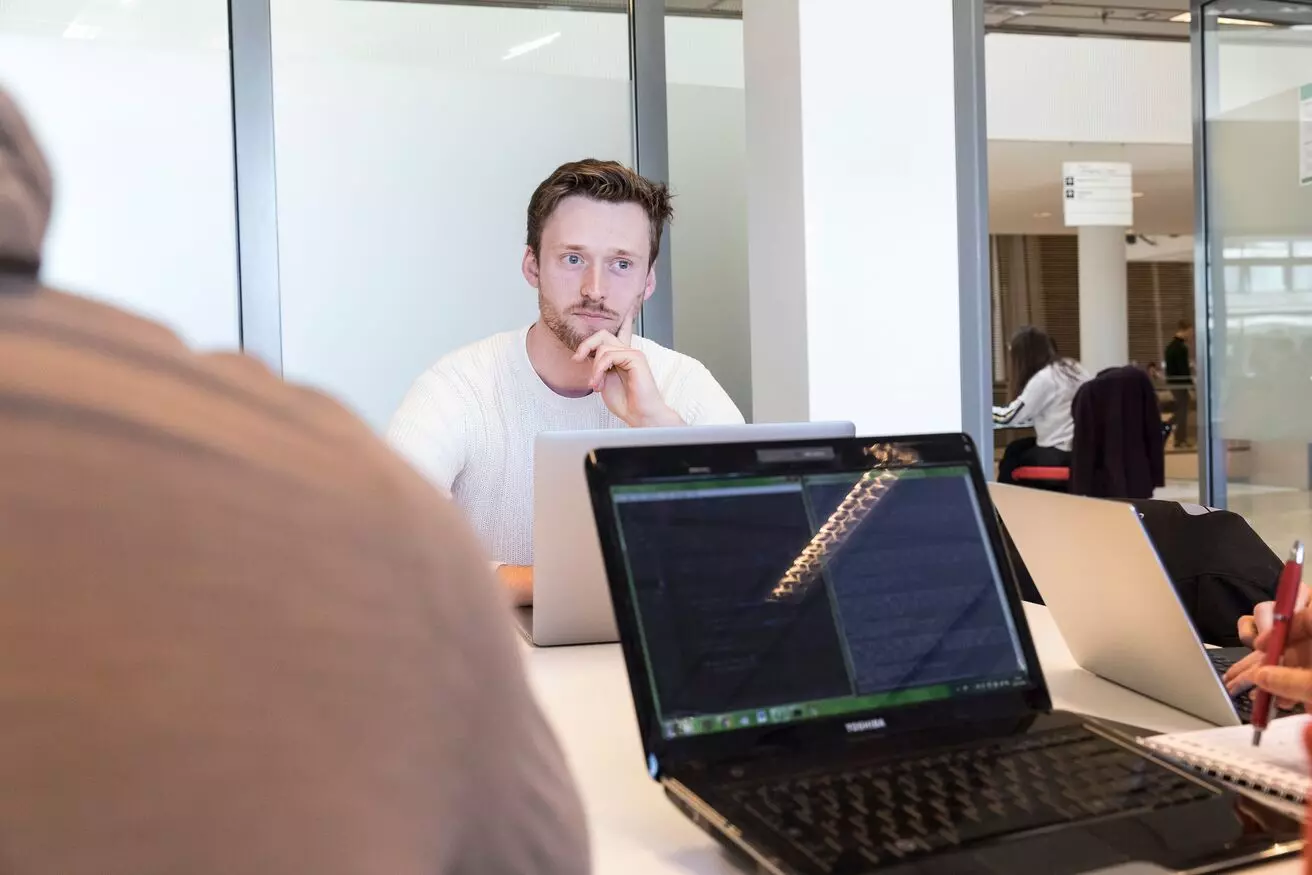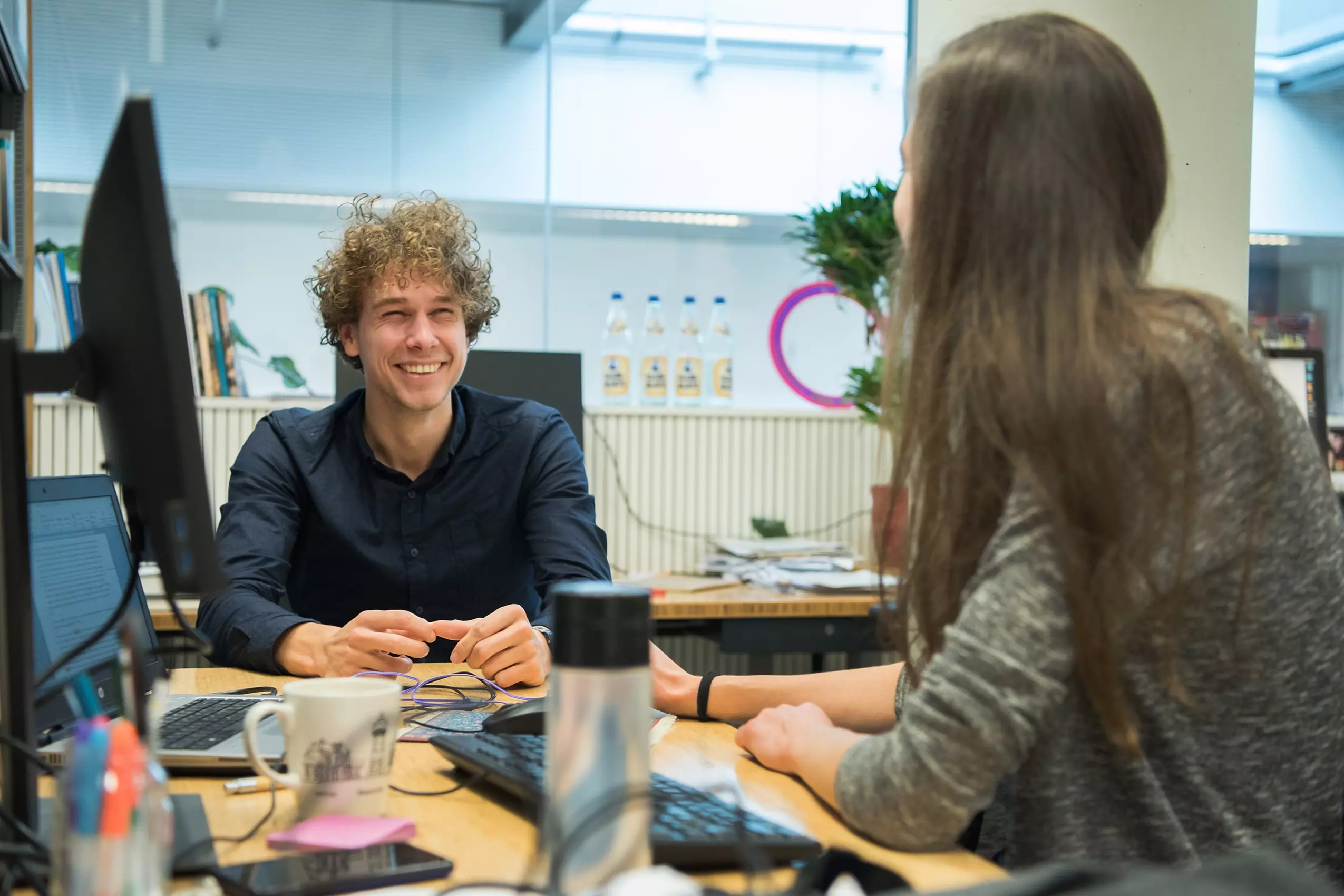
Are you eager to push optical atomic clocks to new levels in a lively, international research group? Do you enjoy creating complex machines that have never existed before? Do you want to explore physics that nobody else has seen? Maybe you want to join our team as a PhD on our exciting journey towards the first continuous superradiant clock. We are the ultracold strontium group at the University of Amsterdam and you can read more about the project here.
PhD Position in Continuous Atomic Clocks
- Faculty of Science
- 14250
- Master's
- €2.901 - €3.707
- 38 hours
- Closes on24-08-2025
.jpg)
Are you eager to push optical atomic clocks to new levels in a lively, international research group? Do you enjoy creating complex machines that have never existed before? Do you want to explore physics that nobody else has seen? Maybe you want to join our team as a PhD on our exciting journey towards the first continuous superradiant clock. We are the ultracold strontium group at the University of Amsterdam and you can read more about the project here.
PhD Position in Continuous Atomic Clocks
- Faculty of Science
- 14250
- Master's
- €2.901 - €3.707
- 38 hours
- Closes on24-08-2025
Working at the UvA
Join Us!
This PhD position is part of the Gen-Q programme, which has received funding from the European Union’s Horizon Europe research and innovation programme under the Marie Sklodowska-Curie grant agreement number 101217386. You will participate in network meetings across Europe, where you will learn about quantum technology from experts in the field and train essential skills, such as academic writing and outreach. You will participate in a summer school and regular consortium meetings with the other PhDs. You will spend time in the lab of a consortium partner.

Working at the UvA
Join Us!
This PhD position is part of the Gen-Q programme, which has received funding from the European Union’s Horizon Europe research and innovation programme under the Marie Sklodowska-Curie grant agreement number 101217386. You will participate in network meetings across Europe, where you will learn about quantum technology from experts in the field and train essential skills, such as academic writing and outreach. You will participate in a summer school and regular consortium meetings with the other PhDs. You will spend time in the lab of a consortium partner.
All about this vacancy
This is what you will do
With this project, you will join a team of experimental quantum physicists at the University of Amsterdam who are building a new type of optical clock. Optical clocks are the most precise measurement instruments in the world, going wrong by only one second over the lifetime of the universe. They enable searches for beyond standard model physics, can explore quantum many-body systems, and have practical applications in geodesy, navigation and network synchronization.
State-of-the-art optical clocks are working in a pulsed fashion and need hours of averaging to reach their final accuracy. A main goal of our research is to reduce this to a few minutes, which would open new opportunities for clocks. We want to achieve this by creating a superradiant clock, which is a special type of laser that lasers on an ultranarrow optical transition. To realize this clock, we are using technology that we have developed to achieve continuous Bose-Einstein condensation [Nature 606, 683–687 (2022)]. You can read about our plans for this clock in Sheng Zhou’s PhD thesis.
This project is embedded in the QDNL Ultracold Atom Quantum Sensing Testbed, which will allow you to learn about many interesting projects related to your PhD, such as creating a European optical time and frequency distribution network, building an industry prototype of an optical clock, building continuously operating atom interferometers, or improving the way in which optics is built. Our group has furthermore quantum simulation experiments using Rb-Sr mixtures or single Sr atoms in optical tweezer arrays. Your PhD project will profit from synergy with all these activities.
What we ask of you
- at least 8 months of master project in experimental ultracold atom or trapped ion group;
- good team working skills;
- good English skills;
- experience with at least a few of the following: experimental work with optics, lasers, electronics, experiment control software;
- some experience with data analysis;
- strong letter of recommendation from master project supervisor;
- Beneficial skill: programming, including some languages of the following list: C, C++, Python, Matlab, Mathematica. Programming skills will be used to build experiment control systems, data analysis systems, and to perform numerical simulations of experiments.
For MSCA PhD positions it is required that the applicant shall at the date of recruitment be in the first four years (full-time equivalent research experience) of their research careers and have not been awarded a doctoral degree. The applicant must not have resided or carried out her/his main activity (e.g. work or studies) in the Netherlands for more than 12 months in the three years immediately prior the recruitment date.
This is what we offer you
A temporary contract for 38 hours per week for the duration of 4 years (the initial contract will be for a period of 18 months and after satisfactory evaluation it will be extended for a total duration of 4 years). The preferred starting date is 1 October 2025 or as soon as possible after that. This should lead to a dissertation (PhD thesis). We will draft an educational plan that includes attendance of courses and (international) meetings. We also expect you to assist in teaching undergraduates and master students.
All about this vacancy
This is what you will do
With this project, you will join a team of experimental quantum physicists at the University of Amsterdam who are building a new type of optical clock. Optical clocks are the most precise measurement instruments in the world, going wrong by only one second over the lifetime of the universe. They enable searches for beyond standard model physics, can explore quantum many-body systems, and have practical applications in geodesy, navigation and network synchronization.
State-of-the-art optical clocks are working in a pulsed fashion and need hours of averaging to reach their final accuracy. A main goal of our research is to reduce this to a few minutes, which would open new opportunities for clocks. We want to achieve this by creating a superradiant clock, which is a special type of laser that lasers on an ultranarrow optical transition. To realize this clock, we are using technology that we have developed to achieve continuous Bose-Einstein condensation [Nature 606, 683–687 (2022)]. You can read about our plans for this clock in Sheng Zhou’s PhD thesis.
This project is embedded in the QDNL Ultracold Atom Quantum Sensing Testbed, which will allow you to learn about many interesting projects related to your PhD, such as creating a European optical time and frequency distribution network, building an industry prototype of an optical clock, building continuously operating atom interferometers, or improving the way in which optics is built. Our group has furthermore quantum simulation experiments using Rb-Sr mixtures or single Sr atoms in optical tweezer arrays. Your PhD project will profit from synergy with all these activities.
What we ask of you
- at least 8 months of master project in experimental ultracold atom or trapped ion group;
- good team working skills;
- good English skills;
- experience with at least a few of the following: experimental work with optics, lasers, electronics, experiment control software;
- some experience with data analysis;
- strong letter of recommendation from master project supervisor;
- Beneficial skill: programming, including some languages of the following list: C, C++, Python, Matlab, Mathematica. Programming skills will be used to build experiment control systems, data analysis systems, and to perform numerical simulations of experiments.
For MSCA PhD positions it is required that the applicant shall at the date of recruitment be in the first four years (full-time equivalent research experience) of their research careers and have not been awarded a doctoral degree. The applicant must not have resided or carried out her/his main activity (e.g. work or studies) in the Netherlands for more than 12 months in the three years immediately prior the recruitment date.
This is what we offer you
A temporary contract for 38 hours per week for the duration of 4 years (the initial contract will be for a period of 18 months and after satisfactory evaluation it will be extended for a total duration of 4 years). The preferred starting date is 1 October 2025 or as soon as possible after that. This should lead to a dissertation (PhD thesis). We will draft an educational plan that includes attendance of courses and (international) meetings. We also expect you to assist in teaching undergraduates and master students.
Your place at the UvA
You will work in this team
The Faculty of Science has a student body of around 8,000, as well as 1,800 members of staff working in education, research or support services. Researchers and students at the Faculty of Science are fascinated by every aspect of how the world works, be it elementary particles, the birth of the universe or the functioning of the brain.
The strontium quantum gases group is headed by Prof. Florian Schreck and is part of the Quantum Gases & Quantum Information cluster at the Institute of Physics (IoP) of the University of Amsterdam (UvA). The main focus of the group is the use of ultracold Sr gases for novel precision measurement techniques and the study of many-body physics.
Want to know more about our organisation? Read more about working at the University of Amsterdam.
More about the UvA
The University of Amsterdam is ambitious, creative and committed. An inspiration to students since 1632, a vanguard player in international science and a partner in innovation.
The University of Amsterdam is the largest university in the Netherlands, with the broadest range of courses on offer. An intellectual hub with 42,000 students, 6,000 staff and 3,000 PhD students. Connected by a culture of curiosity.
Your place at the UvA
This is where you will be working
You will work in this team
The Faculty of Science has a student body of around 8,000, as well as 1,800 members of staff working in education, research or support services. Researchers and students at the Faculty of Science are fascinated by every aspect of how the world works, be it elementary particles, the birth of the universe or the functioning of the brain.
The strontium quantum gases group is headed by Prof. Florian Schreck and is part of the Quantum Gases & Quantum Information cluster at the Institute of Physics (IoP) of the University of Amsterdam (UvA). The main focus of the group is the use of ultracold Sr gases for novel precision measurement techniques and the study of many-body physics.
Want to know more about our organisation? Read more about working at the University of Amsterdam.
More about the UvA
The University of Amsterdam is ambitious, creative and committed. An inspiration to students since 1632, a vanguard player in international science and a partner in innovation.
The University of Amsterdam is the largest university in the Netherlands, with the broadest range of courses on offer. An intellectual hub with 42,000 students, 6,000 staff and 3,000 PhD students. Connected by a culture of curiosity.
Important to know
Your application & contact
If you feel the profile fits you and you are interested in the job, we look forward to receiving your application by email to [email protected] and in addition by an online submission via the button below. We accept applications until and including 24.8.2025.
If you have any questions or do you require additional information? Please contact:
Florian Schreck, [email protected]
Applications should include the following information (for the application through this website: all files besides your cv should be submitted in one single pdf file; for the application by email: simply describe everything except the CV in the email itself and attach your CV):
- a detailed CV including the months (not just years) when referring to your education and work experience;
- a short letter of motivation;
- a link to your master thesis, if you already wrote it, or a short description of what it will contain;
- the name and email address of your master thesis supervisor or another reference who can provide a letter of recommendation.
A knowledge security check can be part of the selection procedure.
(for details: national knowledge security guidelines)
Diversity, Equity & Inclusion
As an employer, the UvA maintains an equal opportunities policy. We value diversity and are fully committed to being a place where everyone feels at home. We nurture inquisitive minds and perseverance and allow room for persistent questioning. With us, curiosity and creativity are the prevailing culture.
Important to know
Your application & contact
If you feel the profile fits you and you are interested in the job, we look forward to receiving your application by email to [email protected] and in addition by an online submission via the button below. We accept applications until and including 24.8.2025.
If you have any questions or do you require additional information? Please contact:
Florian Schreck, [email protected]
Applications should include the following information (for the application through this website: all files besides your cv should be submitted in one single pdf file; for the application by email: simply describe everything except the CV in the email itself and attach your CV):
- a detailed CV including the months (not just years) when referring to your education and work experience;
- a short letter of motivation;
- a link to your master thesis, if you already wrote it, or a short description of what it will contain;
- the name and email address of your master thesis supervisor or another reference who can provide a letter of recommendation.
A knowledge security check can be part of the selection procedure.
(for details: national knowledge security guidelines)
As an employer, the UvA maintains an equal opportunities policy. We value diversity and are fully committed to being a place where everyone feels at home. We nurture inquisitive minds and perseverance and allow room for persistent questioning. With us, curiosity and creativity are the prevailing culture.
Other interesting vacancies for you

PhD Candidate in Neuronal Imaging, Optogenetics and Perception
- Faculty of Science
- €2.901 - €3.707
- Closes on27-07-2025
- Master's
- 38 hours
Join Us in unravelling the brain mechanisms of visual perception!
View vacancy

PhD Linking Individual Movement Behaviour and Population Dynamics
- Faculty of Science
- €2.901 - €3.707
- Closes on18-07-2025
- Master's
- 38 hours
Are you in interested in exploring the connection between movement behavior and ecological dynamics? Do you enjoy combining mathematical models and data to understand how ecological systems work? The Department of Theoretical and Computation Ecology is looking for an ambitious PhD student to work at the intersection of movement ecology and community ecology.
View vacancy

PhD Position: Concept Drift in Representations of Smart Environments
- Faculty of Science
- €2.901 - €3.707
- Closes on07-07-2025
- Master's
- 38 hours
Are you eager to contribute to world-class research in fundamental aspects of sensor data analysis? Are you interested in modelling and reasoning for cyber-physical systems? Would you like to work on prevention of models' performance degradation? Then you should apply to our PhD position at the University of Amsterdam, researching concept drift in sensor-rich environments.
View vacancy
Other interesting vacancies for you

PhD Candidate in Neuronal Imaging, Optogenetics and Perception
- Faculty of Science
- €2.901 - €3.707
- Closes on27-07-2025
- Master's
- 38 hours
Join Us in unravelling the brain mechanisms of visual perception!
View vacancy

PhD Linking Individual Movement Behaviour and Population Dynamics
- Faculty of Science
- €2.901 - €3.707
- Closes on18-07-2025
- Master's
- 38 hours
Are you in interested in exploring the connection between movement behavior and ecological dynamics? Do you enjoy combining mathematical models and data to understand how ecological systems work? The Department of Theoretical and Computation Ecology is looking for an ambitious PhD student to work at the intersection of movement ecology and community ecology.
View vacancy

PhD Position: Concept Drift in Representations of Smart Environments
- Faculty of Science
- €2.901 - €3.707
- Closes on07-07-2025
- Master's
- 38 hours
Are you eager to contribute to world-class research in fundamental aspects of sensor data analysis? Are you interested in modelling and reasoning for cyber-physical systems? Would you like to work on prevention of models' performance degradation? Then you should apply to our PhD position at the University of Amsterdam, researching concept drift in sensor-rich environments.
View vacancy

Don't miss out on your dream job!
Sign up for a job alert and you'll receive automatic updates about new and relevant vacancies.

Don't miss out on your dream job!
Sign up for a job alert and you'll receive automatic updates about new and relevant vacancies.
This website uses cookies
We, and third parties, use cookies on our website. We use cookies to ensure that our website functions properly, to store your preferences, to gain insight into visitor behavior, but also for marketing and social media purposes (showing personalized advertisements). By clicking 'Accept', you agree to the use of all cookies. In our Cookie Statement. you can read more about the cookies we use and save or change your preferences. By clicking 'Refuse' you only agree to the use of functional cookies.
